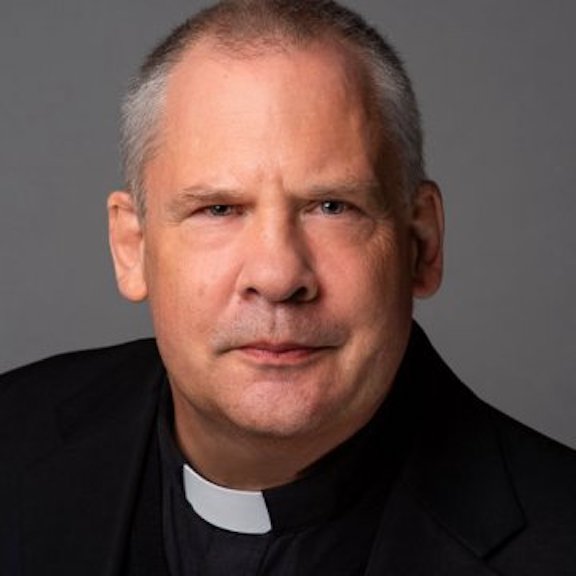Isaiah the prophet poetically describes the meandering but relentless Word of God: “Thus says the LORD: Just as from the heavens the rain and snow come down and do not return there till they have watered the earth, making it fertile and fruitful. . .so shall my word be that goes forth from my mouth; my word shall not return to me void, but shall do my will, achieving the end for which I sent it.” (Is. 55:10-11)
Isaiah’s prophecy comes to fulfillment in Jesus Christ, the Word made flesh, as summarized in the Apostles’ Creed. But God also sends us – in Christ – to accomplish His word according to His will.
Years ago, Helen Hull Hitchcock of Women for Faith and Family explained why our mutual friend, Father Paul Mankowski, chose to study Comparative Semitic Philology – the structural and historical development of the language. The great battle for the Church, he explained to her, is a struggle over the significance of words. By understanding and defending their meanings, he would witness to the Word and defend the Catholic Faith.
We encounter the Word primarily at Mass. So when the Mass was retranslated from the Latin into English during the 1990s, the new translation couldn’t escape Paul’s scrutiny. Behind the scenes, Paul critiqued the revised texts phrase by phrase. With his customary incisive orthodoxy, he summarized the chief problems:
1) REPLACEMENT OF THE THEOLOGICALLY OBJECTIVE WITH THE PERSONAL, EXISTENTIAL, OR SUBJECTIVE. At several places, the proposed version departed from the original Latin to introduce a subjectivist perspective. This serves to accelerate a change in Western Christendom described by one of its proponents as “the shift from the experience of religious authority to the authority of religious experience.” Though quite subtle, this change might have the most far-reaching doctrinal consequences of any proposed.
2) NEUTERING OF THE GODHEAD. The Triune God is alternately hermaphroditized and gelded by linguistic periphrases that do violence to English usage to avoid the imputation of masculinity to the Godhead. The upshot is to make more remote the connection of the God of our Church with the God of Israel.
3) DISPLACEMENT OF THE FATHER. The use of the word “Father” of the First Person of the Trinity was greatly reduced, casting doubt as to how firmly the Church still holds the first article of the Creed, and further obscuring the centrality of the Father in the action of the Eucharist.
4) CAPITULATION TO IDEOLOGICALLY MOTIVATED AGITATION. Aside from problems of general theological obtuseness, the changes represented concessions made to pressure groups – often feminist, and in one instance, ecologist. The precedent boded ill for the continued unity and stability of Catholic worship.

Paul’s prognosis was grim: “Should it come into use, the proposed Sacramentary will not only fail to transmit the Church’s worship faithfully but contribute to the extinction of Trinitarian Christianity in the English-speaking Church.”
Unexpectedly in God’s providence, not only did Paul’s critiques (there were many of them) help persuade Vatican officials to make changes to the translation approved by the American bishops. His principles of translation (offered anonymously) found their way into a high-level Vatican document approved by Pope John Paul II in 2001, Liturgiam Authenticam.
Paul despised the exercise. He confessed by email that he would have preferred physical torture to the drudgery of reviewing another round of politically correct liturgical translations. But the general orthodoxy of the new translation, approved during the papacy of Benedict XVI and released in 2010 (15 years past the original deadline of 1995) is, in large part, owing to Paul’s thankless labors.
Paul paid the price for his vocal orthodoxy within the Jesuits. Longtime friend and former prime minister of Australia, Tony Abbott writes, Paul “excoriated priests and bishops who’d only wear a clerical collar to a protest meeting or who thought that celibacy could be selective.” He added, “Paul endured years of ostracism within the order. Literally for decades, he was on the verge of expulsion and denied the opportunity to take final vows.”
I thought of Paul when, not long ago, I received an email describing elite leadership training in the military. The training mimics a North Korean POW camp and teaches soldiers how to survive as a POW while still resisting.
The school is rough, both physically and mentally. The person who bears the brunt of the abuse is the Senior Ranking Officer (SRO) of the 50-man Company. The SROs usually go one of three ways during the training: 1) They are too weak, so they capitulate to the enemy, which often leads others to submit; 2) They stand too hard on their ideals, get taken out and (faux) shot, leaving the company leaderless; 3) They comply only as much as necessary – never capitulating and sheltering the rest of the Company as much as possible. They make hard decisions, protect the Company’s soul, and, together, they survive.
This third leader is the type that is critical to the survival of the entire Company. He carries the burden of keeping the Company together. He sets the standard. Compliance is an act of the body, capitulation is an act of the mind, and compliance is not always capitulation. Paul was such a leader. Our broken culture needs many more such leaders.
Despite the disrespect and humiliation he received from some of his superiors, as his trenchant writing makes clear, Paul never compromised the Catholic Faith. And his orthodoxy and zeal stiffened the spines of many priests, including mine. In God’s providence, that also was part of his mission in life.
Paul was a humble and fierce soldier for Christ, a true son of Saint Ignatius. His mission is now complete and he returns to the hands of the Father. As we pray for the happy repose of his soul, we now have the privilege of emulating his faith and leadership in the service of the Word.














